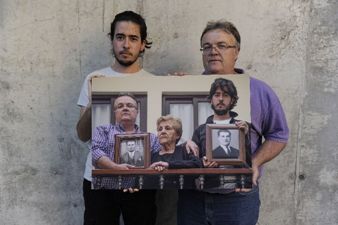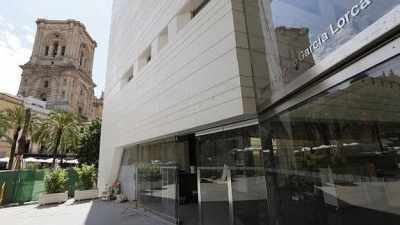Lorca’s Play Without a Title gets an ending, 80 years after his death
Eighty years after Federico García Lorca was murdered in the early days of the Spanish civil war, an unfinished play by the poet and dramatist has finally been completed and given a title. Lorca had written only the first section of the three-act work, known until now as Comedia sin título, or Play Without a Title, when he was killed by a fascist death squad near Granada in August 1936. Eight decades on, another Spanish playwright and poet, Alberto Conejero, has taken up where Lorca left off, adding two acts to the play now known as El sueño de la vida, or The Dream of Life. [27 December 2016, full article]
When Cohen, Lorca, rock and flamenco came together
It’s a documentary about an album, but not just any album: one that fused the poetry of the late Leonard Cohen and Federico Garcia Lorca with the voice of flamenco giant Enrique Morente. Released in Spain on Friday, just one week after the death of the Canadian poet and musician, the documentary tells the story of Omega, which became one of the most innovative albums in the history of flamenco when it came out in 1996. Morente controversially joined forces with alternative rock band Lagartija Nick to adapt the words of Lorca and Cohen songs such as “Hallelujah” or “First we take Manhattan” in Spanish. For Cohen, a huge admirer of flamenco and Lorca – so much so that he named his daughter after the Spanish poet – the record was a delight…Twenty years after “Omega” was launched, director Jose Sanchez-Montes decided to make this commemorative documentary to try and develop a wider, more objective understanding of the album. [18 November 2016, full article.]
For more news about the Omega album and documentary, along with a sample track and the film trailer, see this Billboard article published just ten days before Leonard Cohen’s death.
 |
 |
Leonard Cohen, the poet channelling Byron and Lorca
“Now, you know of my deep association and confraternity with the poet Federico García Lorca. I could say that when I was a young man, an adolescent, and I hungered for a voice, I studied the English poets and I knew their work well, and I copied their styles, but I could not find a voice. It was only when I read, even in translation, the works of Lorca that I understood that there was a voice. It is not that I copied his voice; I would not dare. But he gave me permission to find a voice, to locate a voice, that is to locate a self, a self that is not fixed, a self that struggles for its own existence. As I grew older, I understood that instructions came with this voice. What were these instructions? The instructions were never to lament casually. And if one is to express the great inevitable defeat that awaits us all, it must be done within the strict confines of dignity and beauty.” That quote from a speech made by Leonard Cohen when he received the Prince of Asturias literature prize in Spain in 2011 is a measure of the singer’s fastidious and thoughtful approach to art and life… [11 November 2016, full article]
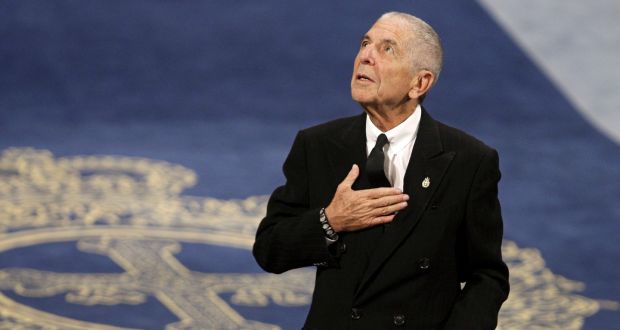
The power of love, metaphor and death
The year 2016 is a significant literary year for Spain. For Spain, this year marks two great writers’ death anniversaries — the 400th of Miguel Cervantes (1547-1616) and the 80th of Federico García Lorca (1898-1936). It is for this reason the Cervantes Institute, with the support of the Spanish Embassy, invited me to celebrate this event in Indonesia by composing music based on works by these two great writers, to be sung by the rising young soprano Mariska Setiawan during the recent Ubud Writers and Readers Festival. While Lorca has long been cherished by the hearts of Indonesian literature, Cervantes is still not — and that could be an indication of how Spain has missed the opportunity to use his name and works as a cultural asset during these 400 years. [4 November 2016, full article]
Archaeologists hopeful of finding Lorca remains after unearthing bullet
A team of researchers digging ground near Granada in search of Federico García Lorca’s elusive remains believe they are close to finding the poet after discovering a bullet and the possible location of the wells where it is believed his body was dumped. “We’re hopeful. We are following the script of what we expected,” the team’s chief archaeologist, Javier Navarro, told The Telegraph. The remains of a bullet were discovered at the dig site on Wednesday once several metres of earth had been moved in order to reach the original ground level as it would have been at the start of Spain’s civil war in August 1936, when the poet was summarily executed alongside three other men. [7 October 2016, full article]
Spain: Searching for García Lorca
On Tuesday, King Felipe VI of Spain addressed the United Nations General Assembly. The young monarch referred to the political deadlock and economic situation in Spain, and called on Spanish politicians to “protect and improve the welfare state”, and assist those “affected” by the recession. He even managed to call for a negotiated handover of Gibraltar to Spain. Not mentioned in his address, however, was the political conflict surrounding the memory of the Spanish civil war, the renewed efforts to find the remains of poet Federico Garcia Lorca, one of Franco’s most famous victims, and the role of the UN in the process. [23 September 2016, full article]
San Sebastian: HBO, Sony take rights for LGBT drama ‘Rara’
[Pepa] San Martin…is on a roll and announced her next project, one of the eight 45-minute episodes of a TV series from Roberto Caston, Lorcas, about historic Spanish poet Federico Garcia Lorca. “This would actually usher in a new concept in television, art house TV. Each episode is a different Latin director with a different voice and vision,” Lopez, who will produce San Martin’s episode, explained. “Lorca is an important figure in all of Latin America.” The project sports a list of Latin America’s hottest directors: Golden Shell winner Mariana Rondon, Locarno’s recent best director winner Joao Pedro Rodrigues, The L-Word’s Rose Troche, and Caston, who has already finished what will be the series’ second episode. The series presents a kaleidoscope of eight different visions about the poet from Granada who was murdered 80 years ago during Spain’s Civil War and who still stands as a literary, artistic, political and cultural symbol. [20 September 2016, full article]
García Lorca: Beyond Poetic Justice
The poem “Landscape without song” (“Paisaje sin canción”) by Spanish poet and playwright Federico García Lorca is included in a mural created by Belgium artist Benoît van Innis which was inaugurated in the Metro station of Maelbeek as a memorial to the victims of the terrorist attack perpetrated last March in Brussels. The mural reproduces an olive tree in an area of 2.75 meters high and 6.5 meters wide, with the poem “Landscape without song” written in eight languages (Arabic, Chinese, Dutch, English, French, German, Russian and Spanish) below the olive tree and over the walls besides the mural. [25 August 2016, full article]
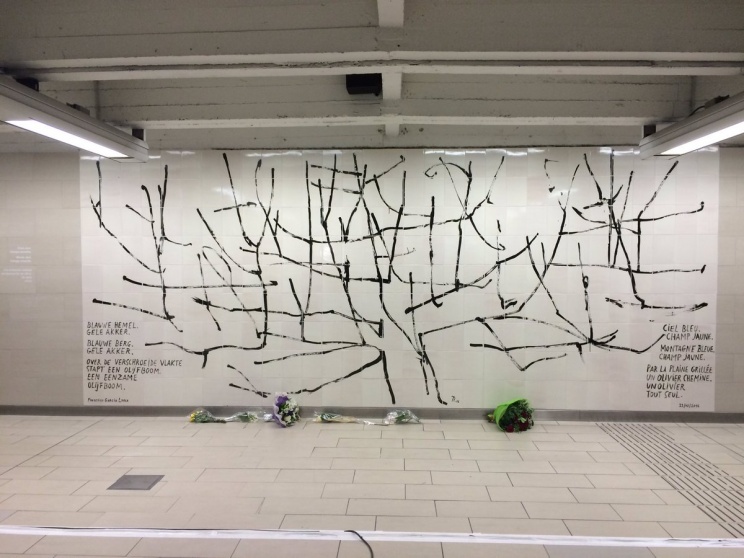
Judge opens investigation into death of Spanish poet Federico García Lorca
An Argentinian judge has started an investigation into the death of Spanish poet and playwright Federico García Lorca, who is believed to have been executed in 1936 by forces loyal to General Francisco Franco. García Lorca’s fate remains a mystery after the site near the Spanish city of Granada where he was believed to have been buried was excavated in 2009 without finding human remains. With efforts by the Spanish justice system stalled, a Spanish human rights group called the Association for the Recuperation of Historic Memory asked Argentinian federal judge Maria Servini to take up the case. She has accepted, said a statement by the group on Facebook. [18 August 2016, full article]
Poetry and politics: The resurrection of Federico García Lorca
…For years after Franco’s victory in 1939, open discussion in Spain about García Lorca’s life, sexuality, and death did not take place. Until the dictator’s death in 1975, only redacted versions of his works were available and Ian Gibson’s account of the poet’s murder was prohibited. Sonnets addressed to a lover (identified four years ago as Juan Ramírez de Lucas) did not appear until 1983. By then, however, in Spain as elsewhere, critical appreciation of García Lorca’s reputation as a writer of high originality had begun to supersede concerns over his sexuality. Today, interest in García Lorca’s life and works is revived…It is a small mercy that in his short life he found the forms to speak to audiences across time. [3 August 2016, full article]
Painful memories of civil war purge live on in southern Spain
…Beltran, a 53-year-old nursing assistant, said the idea was “‘if you don’t think like me, I will eliminate you’ and that is called genocide”. “It was an ideological purge which also included teachers, lawyers, journalists, writers with a liberal ideology,” added Paqui Maqueda, 52, a social worker whose great-grandfather and three great-uncles were killed in the town of Carmona near Seville. She gave the example of the celebrated Spanish poet Federico Garcia Lorca, known for works including the play “Blood Wedding,” who was shot for his suspected leftist sympathies by supporters of the military uprising near the southern city of Granada in 1936… [13 July 2016, full article]
Honoring García Lorca’s genius: A bout over a $22 million archive
GRANADA, Spain — The legacy of Federico García Lorca’s hostilities with government lives on these days through his family, whose members are tangling with officials over control of a new $25 million center built to honor García Lorca, the playwright and poet who was executed by firing squad during the Spanish Civil War. Opened in this historic city last summer, the center was supposed to house an enormous archive of nearly 20,000 items — manuscripts, drawings, musical compositions and artworks valued at more than 20 million euros (about $22 million) — to be preserved in a huge steel strongbox suspended within a white tower of concrete. But today that earthquake-proof container hangs empty. [10 July 2016, full article]
Boston GuitarFest celebrates the rich tradition of Spanish classical guitar
…It would seem the stars aligned for the theme in 2016, since this year marks significant anniversaries in the history of Spanish arts: the 140th anniversary of composer Manuel de Falla’s birth, the 100th anniversary of composer Enrique Granados’s death, and the 80th anniversary of poet Federico Garcia Lorca’s death. These artists, whom Fisk hails as “quintessentially Spanish,” clearly encompassed the Spanish agony and ecstasy through their lives and music. [16 June 2016, full article]

Manuel de Falla (center) with Lorca and his family, Granada, 1929
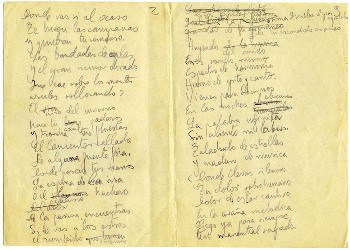 Lorca’s legacy will stay in Spain
Lorca’s legacy will stay in Spain
Spanish authorities are seeking to ensure that the creative legacy of Federico García Lorca will stay in Spain. Faced with the threat of seeing part of his work sold or divided up to pay off a debt estimated at €10 million by the Spanish Culture Ministry, the acting central government and Madrid regional officials have declared the writer’s entire oeuvre a Bien de Interés Cultural (BIC), or Cultural Asset. This legal status aims to afford protection from the mismanagement detected at the foundation that is in charge of preserving his legacy, the Fundación García Lorca. [25 April 2016, original article, second article with additional details]
Palestinian university theatre group wins five Arab Festival awards
Birzeit University’s theatre group, Mawasem Masrahyeh, won five awards for their performance of The House of Bernarda Alba at the 12th Philadelphia Arab Universities Theater Festival held at Philadelphia University in Amman, Jordan. Produced by the Deanship of Student Affairs and directed by Fathi Abdel Rahman, the play was inspired by the work of the Spanish writer and poet Federico Garcia Lorca, which discussed the plight of women in society…The House of Bernarda Alba, according to team manager and activities coordinator Mohammad Hajj Ahmad, discusses gender discrimination. “The play analyzes the possible power relationship that exists in our communities, considering the concepts of social traditions and religion and the consequences of repression.” [21 April 2016, full article]
Budapest holds its third international theatre festival
…“[The] Public” is by the acclaimed Spanish writer Federico Garcia Lorca. It is perhaps his most enigmatic, surreal, scandalous and revolutionary work, as well as being a pithy embodiment of his artistic creed. Lorca attacks norms, mediocrity and intellectual narrow-mindedness, as well as art and theatre that have been crippled by convention. Alex Rigola, Director of the Teatro Abadia in Madrid: “The love, which Lorca speaks about in this drama, is an impossible love but also a strange love, far removed from the everyday. In fact, Lorca’s piece puts homosexuality, his own homosexuality, on the table. We may not consider this as dangerous nowadays, but remember some countries of the world still have the death penalty and equality can be a false equality, because there are still many countries where two homosexuals cannot marry.” [19 April 2016, full article]
 Embassy of Spain supports theatre training in Jamaica
Embassy of Spain supports theatre training in Jamaica
The Embassy of Spain has invited two members of the Sociedad Actoral Hispanoamericana (SAH) – The Hispanic Acting Society of Miami – to visit Jamaica from April 11 to 15, to offer a one-week introduction to theatre workshop, entitled ‘La Barraca’, at the Alpha Institute (formerly Alpha Boys’ School)…’La Barraca’ makes reference to the work of the 19th century poet and dramatist Federico Garcia Lorca, considered one of Spain’s greatest, and his travelling theatre of the same name with the objective of introducing theatre to marginalised groups and areas, in this instance at-risk youth at the Alpha Institute, an artistic point of reference in Jamaica. [9 April 2016, full article]
Respecting our language by using it more
…For us to realise how important any language is to its people, we can recall the story of a soldier fighting in the Spanish Civil in 1936-1939, who kept firing his gun and refused to surrender despite the fact that all his comrades were killed. The leader of the opposing force told his fighters to refrain from firing and wait until the attacker ran out of bullets. Once the soldier was captured, the leader of the opposing force asked the soldier why he did not yield. The soldier revealed a piece of paper containing a poem by Spanish poet Federico Garcia Lorca, and replied: “This is what I’m defending!” [4 April 2016, full article]
IMACP commemorates World Poetry Day
To mark World Poetry Day, declared in 2001 by the United Nations Educational, Scientific and Cultural Organization (UNESCO), the Municipal Institute of Art and Culture (IMACP for its acronym in Spanish) Puebla includes a series of activities at the zócalo [principal square] of the city next March 19th, which seeks to promote this literary genre. At a press conference, the deputy director of Artistic and Cultural Development of IMACP, Rafael Navarro Guerrero, said that “within this framework we will be honoring great poets like Jorge Luis Borges and Federico Garcia Lorca. The zócalo of the city will become the ideal place to listen and interact with poetry. [16 March 2016, full article]
Universal passions: How NYUAD drama students are bringing Lorca up to date
“Everyone, take 10 minutes,” Carlos Díaz León says, as the group of New York University Abu Dhabi drama students break from rehearsals inside the Black Box at the university’s Arts Center. The huge performance space has been transformed to evoke the world of the early 20th-century Spanish playwright Federico García Lorca. [2 March 2016, full article]
Adaptation of Lorca classic cleans up at Feroz Awards 2016
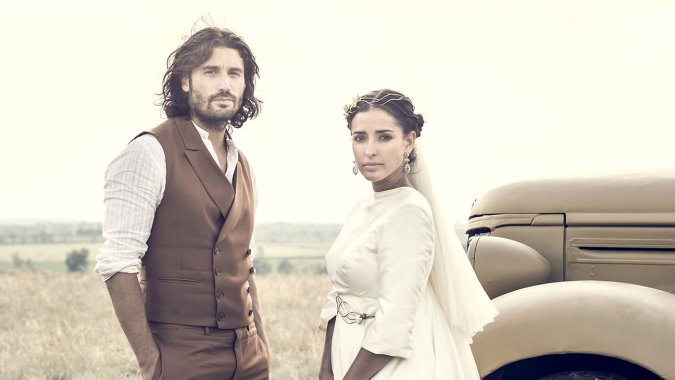 Spain’s equivalent of the Golden Globe Awards, was held in Madrid on January 19. Director Paula Ortiz’s “epic tragedy” The Bride won six awards for best film, best director, best actress, best original music and best trailer. An adaptation of Federico Garcia Lorca’s 1932 play Blood Wedding, The Bride follows a conflicted wife-to-be on her eventful big day, and has previously been described by critics as “polished but over-soaped.” Its soundtrack includes the Leonard Cohen song “Take This Waltz,” the lyrics of which are a loose translation of the much-loved Spanish poem “Pequeno vals vienes,” also by the poet Lorca. [20 January 2016, full article]
Spain’s equivalent of the Golden Globe Awards, was held in Madrid on January 19. Director Paula Ortiz’s “epic tragedy” The Bride won six awards for best film, best director, best actress, best original music and best trailer. An adaptation of Federico Garcia Lorca’s 1932 play Blood Wedding, The Bride follows a conflicted wife-to-be on her eventful big day, and has previously been described by critics as “polished but over-soaped.” Its soundtrack includes the Leonard Cohen song “Take This Waltz,” the lyrics of which are a loose translation of the much-loved Spanish poem “Pequeno vals vienes,” also by the poet Lorca. [20 January 2016, full article]
‘The Bride’ leads Spain’s Goya Awards nominations
The love triangle depicted in Paula Ortiz’s The Bride—a film version of Federico García Lorca’s Blood Wedding—is the favorite for the 30th Goya Awards ceremony, having landed 12 nominations Monday for the prestigious awards handed out by the Spanish Film Academy. [15 December 2015, full article | related article]
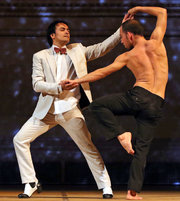
Review: ‘Lorca Madly in Love’ portrays a forbidden romance through flamenco
After the great Spanish poet and playwright Federico García Lorca was assassinated during the Spanish Civil War, his homosexuality was concealed and suppressed for decades. In contemporary Spain, the truth is now widely acknowledged, but for an artist to treat the subject frankly, especially in the tradition-bound world of flamenco, as David Morales does in his show “Lorca Madly in Love,” still counts as taboo-breaking and bold. [26 November 2015, full article]
Film Review: ‘The Bride’
“The Bride” may be a pedestrian choice of title for a new adaptation of Federico Garcia Lorca’s ever-crimson play “Blood Wedding,” but perhaps the change is fitting…Retaining the melodrama of Lorca’s words, but downplaying their ornate poetry and symbolic subtext, Ortiz’s film nonetheless takes (and gives) a certain amount of pleasure in placing unfeasibly beautiful people in telenovela-style poses of emotional distress. [16 November 2015, full article]
Walt Whitman, gay social media, and puppetry are all part of Bart Buch’s intriguing work
…In addition to reading texts by Whitman, Buch also read responses to Whitman’s work, and was intrigued particularly by the writing of Federico Garcia Lorca, who penned a poetic tribute to his predecessor, titled, Ode to Walt Whitman. Buch saw a sort of dialogue between the two queer poets, even though they weren’t alive at the same time. [5 November 2015, full article]
Will it be third time lucky in quest to solve mystery of Lorca’s civil war grave?
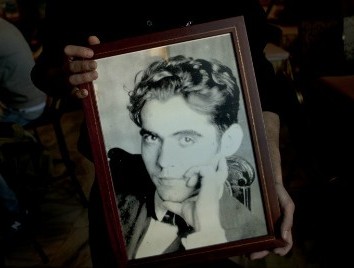 Federico García Lorca, the author of Blood Wedding, Yerma, and The House of Bernada Alba, was executed by a Francoist hit squad during the first months of the Spanish Civil War and his body has lain in an unmarked grave somewhere on a hillside south of Granada ever since. [27 October 2015, full article]
Federico García Lorca, the author of Blood Wedding, Yerma, and The House of Bernada Alba, was executed by a Francoist hit squad during the first months of the Spanish Civil War and his body has lain in an unmarked grave somewhere on a hillside south of Granada ever since. [27 October 2015, full article]
New Lorca centre in Granada opens without manuscripts
After years of construction and delays, the Centro Federico García Lorca in Granada opened without it’s most important part, Lorca’s manuscripts. Accusations of money laundering and falsifying documents have long delayed the opening. And now a dispute over the conditions of the room due to store Lorca’s manuscripts has yet again scuppered progress. [1 August 2015, full article]
Poet Lorca named one of seven most important Spaniards in contemporary history
Federico García Lorca has been chosen as one of the seven Spanish wonders of the world in an online poll. The seven men chosen as the most important Spaniards in contemporary history will be honoured through the distribution of awards to each of their birthplaces. Lorca, Spain’s most popular poet, joins Severo Ochoa, Pablo Picasso, Santiago Bernabeu, Placido Domingo, Santiago Ramon y Cajal and Isaac Peral on the list, determined by popular vote through the website www.7españoles.es. [15 July 2015, full article]
Federico García Lorca, back in the New York groove
Federico García Lorca once again achieved Poet in New York status when a mural depicting the Spanish literary lion went up in Bushwick a couple of years ago. Now he’s returned to Manhattan, where he studied at Columbia in 1929 and penned “Sleepless City: Brooklyn Bridge Nocturne.” The poem is quoted in this new mural by Spanish artist Raúl Ruiz and Brooklyn’s own Cern. [3 July 2015, full article]
Federico García Lorca: LBGTQ hero 117 years after his birth
“A dead man in Spain is more alive than a dead man anywhere in the world,” wrote the late Spanish poet and playwright Federico García Lorca, whose enduring work is still studied and loved across continents. One hundred and seventeen years after his birth on June 5th, 1898, Lorca has become the face of the Spanish government, appearing on education and tourism logos—though paradoxically, he continues as a counterculture icon for political dissidents, exiles and especially the LGBTQ community worldwide. [5 June 2015, full article]
The Castro’s Rainbow Honor Walk: A preview stroll with David Perry
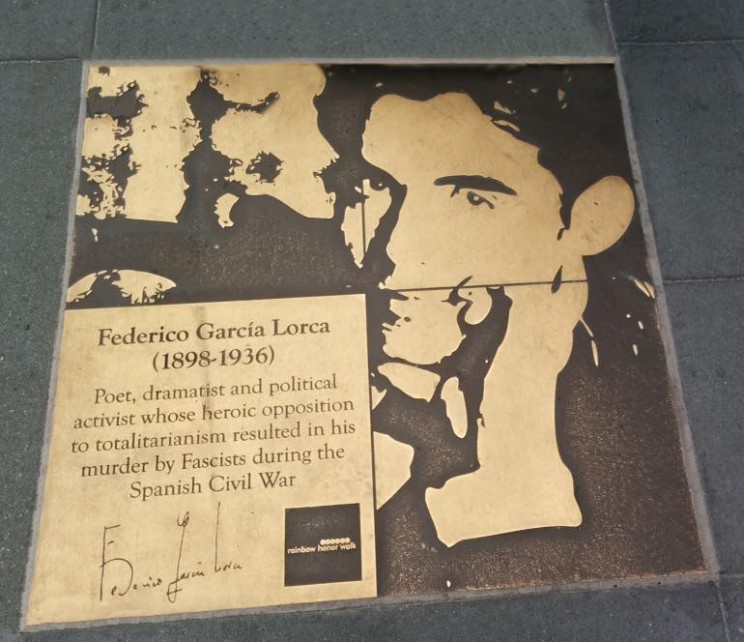 …Among these simultaneous projects is the installation of the Rainbow Honor Walk. Within the next few weeks, a series of 20 bronze plaques commemorating the lives and contributions of LGBT heroes and heroines will be set into the newly-poured sidewalks. The date of the unveiling is still to be announced, but according to the project’s co-founder and board president, David Perry, the plan is that they will all be uncovered simultaneously. [25 July 2014, full article]
…Among these simultaneous projects is the installation of the Rainbow Honor Walk. Within the next few weeks, a series of 20 bronze plaques commemorating the lives and contributions of LGBT heroes and heroines will be set into the newly-poured sidewalks. The date of the unveiling is still to be announced, but according to the project’s co-founder and board president, David Perry, the plan is that they will all be uncovered simultaneously. [25 July 2014, full article]
Lorca in New York: A celebration
Lorca in NY: A Celebration is the largest-ever festival in North America celebrating the work of Federico García Lorca, considered as one of the most influential Spanish poets and playwrights of the last century. Presented by the Fundación Federico García Lorca, the festival will feature more than two dozen events at venues throughout Manhattan, many of which will mine an aspect of Lorca’s classic work, Poet in New York. Anchored by a world-premiere exhibition at The New York Public Library (NYPL) and timed to the release of Farrar, Straus and Giroux’s new, enhanced edition of Poet in New York, the festival marks the first time in more than 25 years that the city pays tribute to Lorca on a grand scale. [5 April 2013, full article]
Name of Federico García Lorca’s lover emerges after 70 years
The identity of the lover to whom Federico García Lorca wrote passionate verse in his final year has been a mystery ever since the poet’s assassination during the Spanish civil war. But now, more than 70 years later, his name has finally emerged. The art critic and journalist Juan Ramírez de Lucas kept a box of mementoes of their year-long passionate relationship, including a previously unseen poem and a diary, hidden away throughout his life. He handed the box to his sister shortly before his death in 2010. [10 May 2012, full article]
